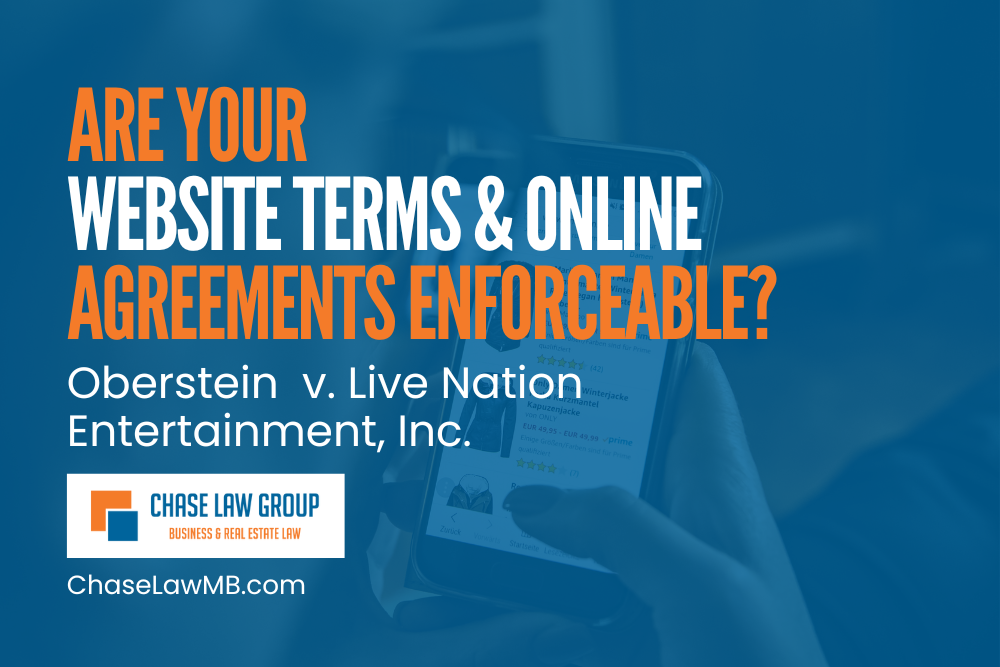Are Your Website Terms & Online Agreements Enforceable?
By Admin February 21, 2023 Category: Business Law Tags: arbitration clause browsewrap business law california contract law chase law chase law group clickwrap contract enforceability court ruling deann chase legal news los angeles business attorney mutual assent ninth circuit court oberstein versus live nation online agreements website terms website terms of use

As business attorneys, Chase Law Group advises our clients on how to make their online agreements as strong and enforceable as possible. Recently, the Ninth Circuit Court of Appeals issued a ruling that offers important insights for businesses looking to create a bulletproof online agreement. In this blog post, we provide some tips on how to draft online agreements that can withstand legal scrutiny and protect your business.
In the case of Oberstein v. Live Nation Entertainment, Inc. a class action lawsuit was filed against Ticketmaster and Live Nation by a group of ticket purchasers who claimed they were charged supra-competitive fees for tickets. The defendants successfully argued that the plaintiffs were bound by an arbitration provision contained in the terms of use on their website, and the court held that the online terms of use constituted a valid agreement between the parties. This ruling offers several valuable lessons for businesses looking to create strong online agreements.
First, it’s essential to ensure that the terms of use are reasonably conspicuous and accessible. The court in Oberstein held that the defendants’ terms of use were sufficiently noticeable because they were marked in a different color and font and located directly on top of or below the action button at each of the three independent stages that a user was required to complete before purchasing tickets. This placement made the terms difficult to miss and signaled to users that they were agreeing to the terms by taking action on the website.
Second, the court emphasized the importance of providing constructive notice of the terms of use. The defendants’ website explicitly alerted the user that by creating an account, signing in, or purchasing a ticket, and proceeding to the next page, the user “agrees to our Terms of Use.” This language provided clear notice to users that they were entering into an agreement, and the court found it sufficient to establish mutual assent which is agreement by both parties to a contract.
Third, it’s crucial to ensure that the terms of use identify the parties to the agreement. In Oberstein, the plaintiffs argued that the defendants’ terms of use were invalid under California law because they failed to properly identify the defendants as parties to the agreement. The court rejected this argument, however, finding that a reasonable user could identify the parties based on the terms’ repeated references to the defendants’ common trade names and express references to “Live Nation Entertainment, Inc.”
Finally, it’s important to strike a balance between a “clickwrap” agreement and a “browsewrap” agreement. A clickwrap agreement requires users to check a box explicitly stating “I agree” in order to proceed, while a browsewrap agreement offers terms that are displayed only through a hyperlink and the user supposedly manifests assent to those terms simply by continuing to use the website. The court in Oberstein held that the defendants’ terms of use fell between these extremes and required a fact-intensive inquiry to analyze mutual assent under an objective-reasonableness standard. Although Ticketmaster and Live Nation’s websites satisfied the requirements for establishing constructive notice, the Court noted that “clickwrap is the safest choice.”
In conclusion, the Oberstein decision offers valuable guidance for businesses seeking to create strong and enforceable online agreements. By ensuring that your terms of use are reasonably conspicuous and accessible, provide clear constructive notice, identify the parties to the agreement, and strike a balance between clickwrap and browsewrap, you can create an agreement that will protect your business and withstand legal scrutiny.
As always, it’s essential to consult with an experienced business attorney to ensure that your online agreements meet all legal requirements and protect your business interests. Contact Chase Law Group for assistance with your legal contracts or call us at 310-545-7700.

